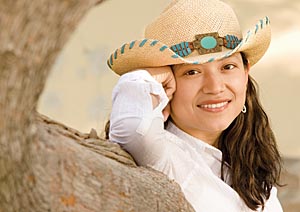Born in rural Mexico, UC Santa Cruz alumna Reyna Grande grew up in extreme poverty. Before she crossed the border to live in Los Angeles at the age of eight, she lived in a cardboard shack with a dirt floor and no running water. She bathed in a dirty canal outside and survived on a diet of only beans and tortillas.
Overcoming the language barrier and her status as an undocumented immigrant in the United States, Grande made the most of her new home, eventually earning a bachelor's degree in creative writing/film & video from UC Santa Cruz in 1999. For her senior project in UCSC's Literature Department, she even wrote the first 80 pages of her debut novel, Across a Hundred Mountains.
The book is now required reading in core courses at UCSC's Porter and Kresge Colleges.
Across a Hundred Mountains illustrates the perils of immigration and crossing the U.S. border, the heartbreaking cycle of poverty, and the fractured family ties and identities of those who make it to the other side. Inspired by her own life -- Grande's father left her to work in the U.S. when she was only a year old -- the novel was published in 2006 to critical acclaim.
As People magazine noted: "Grande's spare, elegantly written tale of a young Mexican girl searching for her farmworker father, missing since he left to seek his fortune in 'el otro lado', is a timely and riveting read."
That the novel is filled with details drawn from Grande's own life adds immeasurably to the poignancy of the story.
"The poverty -- that's very real to my experience," she says. "There's a scene where my character goes to the market and is picking up rotten vegetables out of the trash cans. My sister in Mexico had a habit of picking up things off the ground -- a lollipop or a piece of fruit -- and eating them, just because we didn't have any food."
"I wrote this story because all of the books that I read, especially those by Latino authors, never quite captured my own experience," Grande adds. "A lot of books deal with the children of immigrants -- what they go through and their identity as U.S.-born Latinos. I always felt a little left out because I wasn't born here, and these stories weren't reflecting my personal experience."
Grande decided to attend UCSC on the recommendation of an English teacher at Pasadena City College who thought it would be an ideal, intimate learning environment for her. "Every time she read my essays, she told me to be a writer," Grande recalls. "She steered me to UCSC because she thought it was a place where I could discover myself as a person."
After graduating, Grande was named a 2003 PEN USA Emerging Voices Fellow, which gave her access to free writing classes at UCLA, as well as the opportunity to meet with agents and publishers in the literary world. "That's how I met my agent," says Grande. "I approached her after she gave a presentation, told her about my book, and we soon began working together."
Now a U.S. citizen, Grande lives in Los Angeles with her four-year-old son. When she's not busy working on her next novel -- the story of four women in a Los Angeles-based folklorico group -- Grande helps other immigrants transition into the country by teaching adult English. "I feel really happy that I've been able to do all these things; I know if I stayed in Mexico, I wouldn't have been able to do anything meaningful with my life," she says. "Living in the United States has made me aim high and try to be an example for others."
Since Across a Hundred Mountains was published, Grande has given more than 30 readings in Los Angeles and across the Southwest, including several visits to creative writing classes at UCSC. In light of the recent debates in Congress and increased media focus on immigration, she hopes that her book will offer readers a unique perspective on the politically charged issue.
"Instead of building fences, the U.S. should deal with illegal immigration by helping Mexico improve its economy," observes Grande. "Because I experienced the poverty in Mexico, I understand why people are so desperate to come to this country. But even if you build a fence, people are still starving and will still want to come here; the risks will rise, but the people won't go away. It would be much more humane to help the people in Mexico so they would not be so desperate to come here."
This article first appeared in the Spring 2007 issue of the UCSC Review magazine.
Across a Hundred Mountains may be purchased online from UCSC's Bay Tree Bookstore at slugstore.ucsc.edu



